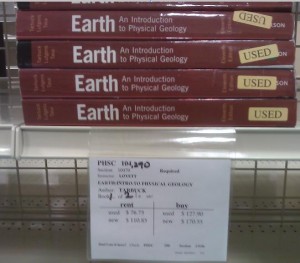How Renting Textbooks Can Save You Thousands
 For the most part I prefer to buy things instead of renting, but when it comes to text books for college, renting may be very advantageous. When I was in college I would try to buy my books used off of half.com, and from time to time I would get a previous edition of the book and make it work in order to save money. I would then sell the books back on half.com. Essentially I was renting the books. The main problem with this solution is that from time to time I would get stuck with a book that had a new edition out. Instead of being able to sell it for 75% to 100% of what I paid for it, I would end up only being able to get a few dollars for it. I recently learned about a company called Campus Book Rentals
For the most part I prefer to buy things instead of renting, but when it comes to text books for college, renting may be very advantageous. When I was in college I would try to buy my books used off of half.com, and from time to time I would get a previous edition of the book and make it work in order to save money. I would then sell the books back on half.com. Essentially I was renting the books. The main problem with this solution is that from time to time I would get stuck with a book that had a new edition out. Instead of being able to sell it for 75% to 100% of what I paid for it, I would end up only being able to get a few dollars for it. I recently learned about a company called Campus Book Rentals. By running the numbers, it looks like students can save several hundred to a couple thousand dollars by using this service over the course of a degree program.
Example Comparison of Buying Vs Renting Textbooks:
I went to my local college bookstore and took note of their prices. For the book Earth: An Introduction to Physical Geology 11th edition, the bookstore had the following prices:
- Buy New $170
- Buy Used $128
- Rent New $111
- Rent Used $77
Yikes.
On Amazon.com the following prices are available:
- Kindle Edition $80
- Loose Leaf Edition $83.50
- New $128
- Used $91
- Rent $27*
Clearly Amazon has an advantage over the college bookstore. A student can save about $40 going with Amazon, whether new or used, and can save another $10 buy going with the loose leaf edition or the kindle edition. The rental option seems appealing, but they have some high extension fees:
$21 for a 15 day extension, $51 for a semester extension.
Campus Book Rentals is a new website which rents books out to students, and does so in an economical fashion. For the above mentioned book they are charging $20 to rent it for 45 days, and only $23 to rent it for 130 days. This is cheaper than Amazon, and way cheaper than buying the book.
IF we assume a total of 40 courses (3 credits each) and a new price per book on Average of $150, or used of $100, with a resale value of 50%, we come up with the following numbers:
- Buy new and keep = $150*40 = $6,000
- Buy used and keep = $100*40 = $4,000
- Buy new and sell = $150*40*.50 = $3,000
- Buy used and sell = $100*40*.50 = $2,000
- Rent at $20 per course = $20*40 = $800
The reason I used a 50% resell rate was to include books that you get stuck with when a new edition comes out, most books 75% plus can be picked up by selling used, but as I mentioned above, from time to time, they become almost worthless. Earth: An Introduction to Physical Geology 10th edition now goes for around $8 used.
Some books are going to cost more than $20 to rent, and some books are going to cost more that $100 used or $150 new, but on average, the math above pans out. If I were to go back to college I would seriously consider renting the vast majority of my textbooks. In some situations it might not make sense, but for the majority of courses, I think such services are a really good deal.


Leave a Reply